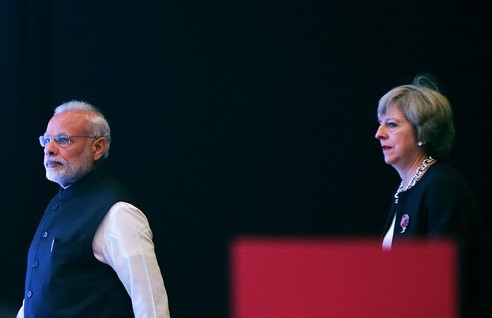Adnan Abidi/Reuters
By
Bikash Mohapatra
While there are sections who argue that the trade between India and the United Kingdom will suffer considerably in the post-Brexit scenario, a majority opine bilateral collaborations will receive a boost, and the establishment of a Free Trade Agreement between the two countries could be easier to accomplish.
A few facts to begin with:
-
India is the United Kingdom’s largest investor, more than all of Europe put together.
-
The United Kingdom is the G-20 group’s largest investor in India, accounting for about 9 per cent of total foreign investment over the past 15 years.
-
Trade between the two countries was around USD 16 billion in the last fiscal.
-
Over 1.5 million Indians live in the UK, and our companies employ over 100,000 people in that country.
The British Prime Minister Theresa May came to India in November, in what was her first official visit outside Europe, in a bid to boost bilateral trade.
Even though critics opine that the trip was underwhelming, they also admit that direct trade between the two countries post-Brexit would be beneficial for the overall ties. However, there remain questions that need to be answered first.
What is the United Kingdom’s best hope of post-Brexit trade negotiations with India?
What impact will the decline in value of the Pound Sterling have on bilateral trade?
How will the UK’s now stringent immigration policy and the related restrictions on post-study stay?—?in the last five years the number of Indian students enrolling in UK universities have gone down by almost 50 per cent – affect the relations?
Arvind Virmani, former Indian executive director at the International Monetary Fund (IMF), believes Brexit will have a positive impact on Indo-UK ties.
“The UK was increasingly constrained by the European Union. There will be a certain flexibility now, and that is one of the positives to come out of Brexit,” he explains, before throwing in a caveat.
“Unless India is given a larger participation in the big agencies like the UN Security Council, the IMF and the World Bank, nothing would work.”
In the post-Brexit scenario, the Federation of Indian Chambers of Commerce and Industry (FICCI) carried out a sectoral survey, involving the 800 Indian companies in Britain, and enumerated as under is the response they received:
-
Things will be uncertain for the next three years. The parties have to renegotiate the contacts they are in and further investment plans could be kept on hold depending on the regulatory uncertainties, considering there will be a constant depreciation of the British Pound.
-
There can be negotiations for a possible UK-India Free Trade Area (FTA), but for the moment it will be on the back-burner.
-
The 800-odd Indian companies operating in the UK also have an interest with what the UK will negotiate with Europe in the near future.
While there are sections who argue that the trade between India and the UK will suffer considerably in the post-Brexit scenario, a majority opine bilateral collaborations will receive a boost, and the establishment of a Free Trade Agreement between the two countries could be easier to accomplish.
Professor Swagata Sen from the University of Calcutta remains positive albeit.
“Only 14 per cent of the Indian companies in the UK operate with the view of accessing the European market,” he reasons, adding, “So it won’t affect the ties as much as it is being perceived.”
The Department of Commerce faculty proceeds to explain his point.
“Brexit may open up new possibilities for both the UK and India, in areas like the higher education segment,” he explains.
“European students will no longer get the preference like earlier, and it will open the way for Indian students. Some relaxation in immigration rules should also be provided to India,” he adds.
Veteran mediaperson Vijay Chauthaiwale concurs.
“The good thing is India will now be able to comfortably manage the conflicting interests,” he explains.
“Britain’s exit per se shouldn’t deter India from having a good relation with both Britain and the EU,” he continues, adding, “More the time Brexit takes, more it will complicate matters, more so because India is forging new partnerships. (For example when Narendra Modi’s recent visit to Ulan Bator made him the first Indian Prime Minister to visit a country like Mongolia)
“Much before the Brexit referendum the trade between the two countries reduced to a third in the last three years. The concessions offered by the British Prime Minister during her recent visit are esoteric to say the least.”
Despite the palpable lacunae there’s renewed optimism that Brexit might lead to Britain seeking an alternate route to India, a better alternative as compared to the tough and drawn-out negotiations on the EU Free Trade Agreement. Therein lies the hope.



No Comments Yet!
You can be first to comment this post!